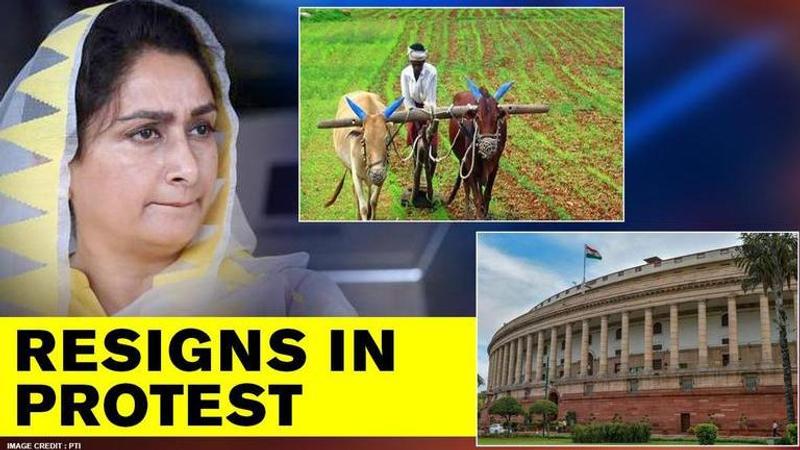Published 20:49 IST, September 17th 2020
Union Minister Harsimrat Kaur Badal resigns from Modi cabinet opposing three Farm Bills
In a major setback to the BJP, its ally Shiromani Akali Dal (SAD) on Thursday, opposed the bills in Lok Sabha. Union minister Harsimrat Kaur Badal resigned

In a major setback to the BJP, its staunch ally Shiromani Akali Dal (SAD) on Thursday, opposed the three Farm bills in the Lok Sabha. SAD president Sukhbir Singh Badal has announced that Union minister Harsimrat Kaur Badal will resign from the government to protest farm bills. The minister herself confirmed the same on twitter. The three bills aimed at massive agricultural reforms were introduced on the first day of the ongoing monsoon session by Union Agriculture Minister Narendra Singh Tomar.
SAD: Badal resigns in protest
Arguments in Lok Sabha on Farm Bills
Defending the Farm bills, BJP MP Jagdambika Pal said, "We have been discussing farmers issues in the parliament, but no government has actually actually taken steps towards these issues. It was only Narendra Modi government that implemented the reforms in the agricultural sector." Backing the BJP's three Farm ordinances, BJD raised practical considerations as to where, how, and whom farmers will sell products. YSRCP, TDP and AIADMK too backed the bills, highlighting farmers' lessened dependence on traders.
Opposing the bills, Congress MPs from Punjab stormed out of the parliament and burnt copies of the bills outside the Lok Sabha. They claimed that the Centre was attempting 'bring everything under the ambit of Parliament'. Meanwhile, RSM accused he BJP government of using the Covid-19 pandemic situation to bulldoze agricultural reforms, misusing Presidential power under Article 123 of the Constitution. Trinamool too vehemently opposed the bills stating, "Behind every single new Bill, Bill replacing another ordinance, is the singular sinister motive of this government to destroy federalism."
What are the three Farm bills?
Amid the nationwide lockdown, the Centre rolled out its third tranche of economic measures to kickstart the economy which included three governance and administrative reforms in agriculture. Amending the Essential Commodities act, the Centre aimed to enable better price realisation for farmers by attracting investments - making agriculture sector competitive. Agriculture foodstuff including cereals, edible oils, oilseeds, pulses, onions and potato to be deregulated while stock limits were to imposed under extreme conditions.
Under the Farmers (Empowerment and Protection) Agreement on Price Assurance and Farm services ordinance, 2020, it provided a framework for the protection and empowerment of farmers with reference to the sale and purchase of farm products overriding all state APMC laws. The ordinance which was promulgated on June 5, 2020, will enable farmers for engaging with processors and aggregators, large retailers, exporters in a transparent way. In the recently released FY 21 - Q1 figures by Centre, Agriculture sector is the only one which grew by 13% due to no lockdowns.
Farmers protest bills
The three farm bills have seen widespread protests across Haryana, Uttar Pradesh and Punjab, with thousands of farmers blocking roads. At Kurukshetra, the police resorted to lathicharge to disperse the agitators, leading to massive outrage criticising the Police and the Haryana government. While Haryana Congress leaders claimed that the ruling BJP government is anti-farmers, the Manohar Lal Khattar government stayed mum till Saturday. Punjab CM Amarinder Singh has already passed a resolution in the Assembly, rejecting the three ordinances, assuring farmers all cases will be withdrawn for their protests.
Updated 21:21 IST, September 17th 2020




